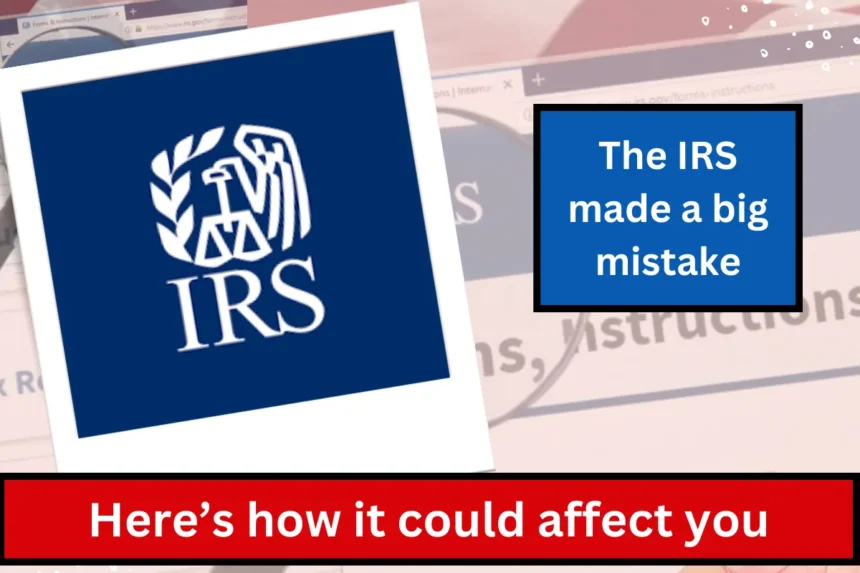A recent mistake by the Internal Revenue Service (IRS) could impact the wallets of many taxpayers. This error led to confusion, especially for those in Pennsylvania, as people received notices claiming they owed money even after paying their taxes in full. Let’s break down what happened, how it affects taxpayers, and what steps you should take if you received one of these incorrect notices.
What Happened?
IRS Mistake Explained
The IRS recently made a significant mistake involving CP14 notices. These notices are sent to inform people of delinquent taxes. However, due to a malfunction in the IRS’s notification system, some taxpayers who had already paid their taxes in full received these notices incorrectly.
Confusion and Concerns
Many taxpayers, upon receiving these notices, thought they might be victims of a tax-related phishing scam. The IRS quickly confirmed that the notices were legitimate and apologized for the mistake. The error occurred because some CP14 notices were issued before the payments were fully processed or due to inaccuracies in documentation requiring further review.
How This Affects Taxpayers
Impact on Paid Taxpayers
If you have already paid your taxes but received a CP14 notice, it can be alarming. The IRS recommends that you check the status of your tax account on their official website to ensure there are no outstanding balances. This step is crucial to confirm that your payment has been processed correctly.
For Those Who Haven’t Paid
If you have not paid your taxes and received a CP14 notice, you should follow the instructions on the notice to update your account and make the necessary payments. Ignoring these notices can lead to further issues with the IRS, including penalties and interest.
What To Do Next
Steps for Taxpayers Who Paid
Check Your Account Online: Visit the IRS website and verify your tax account using your Social Security Number (SSN).
Confirm Payment Status: Ensure your payment has been processed and no outstanding balance remains.
Ignore Incorrect Notices: If your account shows no balance due, you can disregard the CP14 notice.
Steps for Taxpayers Who Haven’t Paid
Follow Notice Instructions: Carefully read the CP14 notice and follow the steps provided to update your account.
Make Necessary Payments: Ensure you pay any outstanding amounts to avoid penalties.
Use IRS Assistance Channels: If you need help, the IRS offers several information and assistance channels to guide you through the process.
Importance of Communication and Vigilance
IRS and Taxpayer Communication
This incident highlights the importance of effective communication between the IRS and taxpayers. It shows how administrative errors can cause unnecessary worry and emphasizes the need for taxpayers to stay informed about their financial obligations.
Regular Account Checks
Taxpayers should regularly check their accounts to ensure all payments are accurately recorded. This practice helps prevent confusion and ensures that any issues can be addressed promptly.
In summary, the recent IRS mistake involving CP14 notices has caused confusion and concern among many taxpayers. If you received one of these notices, it’s essential to check your tax account status and ensure all payments are correctly processed.
For those who haven’t paid their taxes, following the instructions on the notice is crucial to avoid further complications. Staying informed and maintaining clear communication with the IRS can help prevent similar issues in the future.
Frequently Asked Questions (FAQs)
1. What should I do if I received a CP14 notice but have already paid my taxes?
Check your tax account status on the IRS website. If there is no outstanding balance, you can ignore the CP14 notice.
2. How can I verify my payment status with the IRS?
You can verify your payment status online using your Social Security Number (SSN) on the IRS website.
3. What if I haven’t paid my taxes and received a CP14 notice?
Follow the instructions on the notice to update your account and make the necessary payments.
4. Will the IRS correct any penalties and interest due to their mistake?
Yes, the IRS will correct any penalties and interest once the payments are accurately applied.
5. How can I avoid similar issues in the future?
Regularly check your tax account status online and maintain clear communication with the IRS to stay informed about your financial obligations.

